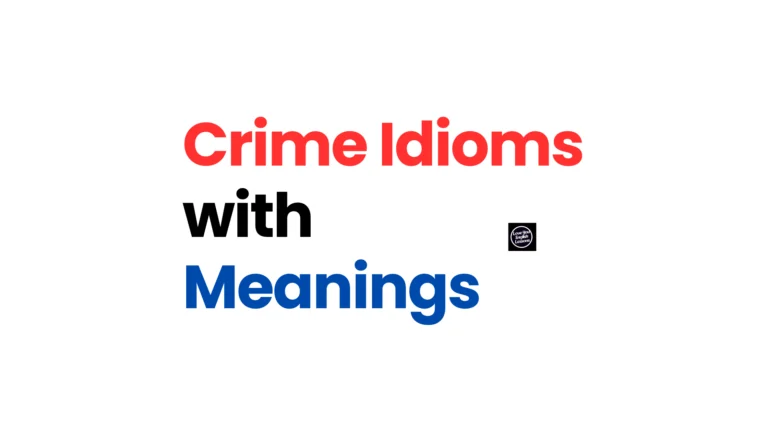English Idioms and Phrases
If you’re learning English, you’ve probably heard the term “idiom” or “phrase” used quite a lot.
These words can be confusing because their meanings aren’t always obvious.
In this post, we’ll dive into what idioms and phrases are, why they’re important, and share some fun examples to help you speak like a native!
What Are Idioms and Phrases?
Before we start exploring idioms and phrases, let’s understand what they actually are.
- Idioms: An idiom is a group of words whose meaning is different from the meanings of the individual words. For example, “break the ice” doesn’t mean breaking actual ice; it means to start a conversation and make people feel comfortable.
- Phrases: A phrase is a small group of words that work together to express an idea. Some phrases may be simple, like “a cup of tea,” and others may have a special meaning, like “call it a day.”
Why Are Idioms and Phrases Important?
Learning idioms and phrases is a fun way to sound more like a native English speaker.
Here’s why they matter:
- Make Your Speech Sound Natural: Native speakers use idioms and phrases all the time. By using them, you can sound more fluent and less like a textbook.
- Understand Conversations Better: When you know common idioms, you’ll be able to understand native speakers better in movies, shows, and real-life conversations.
- Express Yourself Creatively: Idioms and phrases allow you to express ideas in a more interesting and colorful way. Instead of saying “I’m tired,” you could say “I’m feeling under the weather.”
Now that we know why idioms and phrases are so helpful, let’s look at some popular ones and understand their meanings.
1. “Break the Ice”
Meaning: To start a conversation or make people feel more comfortable, especially in a new or awkward situation.
Example: At the party, John told a funny story to break the ice.
2. “A Piece of Cake”
Meaning: Something that is very easy to do.
Example: The exam was a piece of cake! I finished it in 30 minutes.
3. “Under the Weather”
Meaning: To feel sick or unwell.
Example: Sarah can’t come to the meeting today because she’s feeling under the weather.
4. “Spill the Beans”
Meaning: To accidentally reveal a secret or information.
Example: I was planning a surprise party for my friend, but Tom spilled the beans.
5. “Bite the Bullet”
Meaning: To do something difficult or unpleasant that you’ve been avoiding.
Example: I’ve been putting off going to the dentist, but I finally decided to bite the bullet and make an appointment.
6. “Call It a Day”
Meaning: To stop working or doing something, especially after a long period of time.
Example: We’ve been working for hours, let’s call it a day and go home.
7. “Hit the Nail on the Head”
Meaning: To describe exactly what is causing a situation or problem.
Example: When Sarah said the project was delayed due to lack of resources, she hit the nail on the head.
8. “Cost an Arm and a Leg”
Meaning: Something that is very expensive.
Example: That new phone costs an arm and a leg, but I really want it.
9. “A Blessing in Disguise”
Meaning: Something that seems bad at first but is actually good in the end.
Example: Losing my job was a blessing in disguise because it pushed me to start my own business.
10. “The Ball is in Your Court”
Meaning: It’s your turn to take action or make a decision.
Example: I’ve done all I can to help you, now the ball is in your court.
11. “When Pigs Fly”
Meaning: Something that will never happen.
Example: I’ll go skydiving when pigs fly!
12. “It’s Not Rocket Science”
Meaning: Something is not very difficult to understand.
Example: Don’t worry about the instructions. It’s not rocket science; just follow the steps.
13. “Jump on the Bandwagon”
Meaning: To join a popular activity or trend.
Example: Everyone’s using social media now. I think I’ll jump on the bandwagon too.
14. “Hit the Sack”
Meaning: To go to bed or sleep.
Example: I’m really tired after the long trip, so I’m going to hit the sack early tonight.
15. “A Blessing in Disguise”
Meaning: A good thing that isn’t immediately obvious.
Example: Losing my wallet was a blessing in disguise. I ended up finding a better job by accident.
16. “On Cloud Nine”
Meaning: Feeling very happy or excited.
Example: She was on cloud nine when she got accepted into her dream university.
17. “Burn the Midnight Oil”
Meaning: To work late into the night.
Example: I had to burn the midnight oil to finish my assignment.
18. “Cry Over Spilled Milk”
Meaning: To be upset over something that can’t be changed.
Example: It’s no use crying over spilled milk. We just need to move on and try again.
19. “A Penny for Your Thoughts”
Meaning: To ask someone what they are thinking.
Example: You seem quiet today. A penny for your thoughts?
20. “Let the Cat Out of the Bag”
Meaning: To reveal a secret, often by mistake.
Example: I accidentally let the cat out of the bag about Jane’s surprise party.
21. “Burning the Candle at Both Ends”
Meaning: To work too hard and tire yourself out.
Example: I’ve been burning the candle at both ends, trying to finish work and study for exams.
22. “Straight from the Horse’s Mouth”
Meaning: Information that comes directly from the original source.
Example: I heard it straight from the horse’s mouth—John is moving to New York!
23. “The Early Bird Catches the Worm”
Meaning: The person who arrives first or starts early is more likely to succeed.
Example: I woke up early to get the best deal at the market. The early bird catches the worm!
24. “Through Thick and Thin”
Meaning: Supporting someone in good times and bad.
Example: My best friend has always been there for me through thick and thin.
25. “Elephant in the Room”
Meaning: An obvious problem or issue that no one wants to talk about.
Example: The elephant in the room is that we don’t have enough time to finish the project.
Tips for Using Idioms and Phrases
- Start Slowly: Don’t try to use too many idioms at once. Start with a few and use them in your daily conversations.
- Practice: The more you hear and use idioms, the more natural it will feel to include them in your speech.
- Understand the Meaning: Before you use an idiom, make sure you understand its meaning. Using idioms incorrectly can confuse others.
- Use Idioms with Friends First: It’s a good idea to practice idioms with friends or family before using them in formal settings.
Conclusion
Idioms and phrases add color and personality to your language. They help you sound more like a native speaker and make your conversations much more interesting.
By learning and using idioms, you’ll understand English better and be able to express yourself in a fun and creative way.
So, next time you’re chatting with friends or watching a movie, pay attention to the idioms and phrases that come up.
You might be surprised at how much they add to your understanding of English. And remember, practice makes perfect, so keep using these idioms and soon you’ll be speaking like a pro!
Read more:
- Essay About Dinosaurs in English
- Essay About Artificial Intelligence in English
- Essay About Makar Sankranti: A Festival of Joy and Harvest
- Essay about Lohri: The Festival of Joy and Harvest
- A Complete Guide to Writing an Expository Essay
- A Guide to Writing a Narrative Essay







